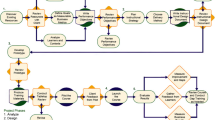Abstract
This paper addresses the following questions: how do students perform metacognitive, cognitive and affective learning functions; how is the execution of learning functions regulated by internal and external sources; what learning styles can be discerned from the viewpoint of learning functions and regulation? Subjects were students from an open distance university and a regular university. They were interviewed extensively about their learning strategies, mental models of learning, learning orientations and interpretations and appraisals of instructional measures. The interviews were analyzed in a phenomenographic way. The results indicate that there are large differences among students in the manner in which they carry out learning functions, that these differences are associated with internal and external sources, and that four qualitatively different learning styles can be discerned: an undirected, a reproduction directed, a meaning directed and an application directed learning style. Mental models of learning and learning orientations turn out to be related to the way in which students interpret, appraise and use instructional measures to regulate their learning activities. It is concluded that in many instances instructional measures do not have the intended effects. Suggestions are given regarding the implications of these results for the improvement of teaching practices in higher education.
Similar content being viewed by others
References
Brown, A.L. (1987). ‘Metacognition, executive control, self-regulation and other more mysterious mechanisms’. In F.E. Weinert & R.H. Kluwe (Eds.), Metacognition, motivation and understanding (pp. 65–116). Hillsdale, NJ: Erlbaum.
Entwistle, N.J., & Ramsden, P. (1983). Understanding student learning. London: Croom Helm.
Flavell, J.H. (1987). ‘Speculations about the nature and development of metacognition’. In F.E. Weinert & R.H. Kluwe (Eds.), Metacognition, motivation and understanding (pp. 21–29). Hillsdale, NJ: Erlbaum.
Gibbs, G., Morgan, A., & Taylor, E. (1984). ‘The world of the learner’. In F. Marton, D. Hounsell & N. Entwistle (Eds.), The experience of learning (pp. 165–188). Edinburgh: Scottish Academic Press.
Janssen, P.J. (1993, July). An analytic framework to describe the experiences of both students and lecturers. Paper presented at the III European Congress of Psychology, Tampere, Finland.
Lonka, K. (1993, September). Activating instruction - How to foster study and thinking skills in higher education. Paper presented at the 5th Conference of the European Association for Research on Learning and Instruction, Aix-en-Provence, France.
Marton, F. (1986). ‘Phenomenography - A research approach to investigating different understandings of reality’. Journal of Thought, 21, 28–49.
Marton, F. (1990). ‘The phenomenography of learning - a qualitative approach to educational research and some of its implications for didactics’. In H. Mandl, E. De Corte, S.N. Bennett & H.F. Friedrich (Eds.), Learning and Instruction - European research in an international context. Volume 2.1 (pp. 601–616). Oxford: Pergamon Press.
Marton, F., Dall'Alba, G., & Beaty, E. (1993). ‘Conceptions of learning’. International Journal of Educational Research, 19, 277–300.
Meyer, E. (1993, September). The individual difference modelling of student learning. Paper presented at the 5th Conference of the European Association for Research on Learning and Instruction, Aix-en-Provence, France.
Moran, A. (1991). ‘What can learning styles research learn from cognitive psychology?’ Educational Psychology, 11, 239–245.
Murphy, K.L. (1990, April). Patronage and an oral tradition: influences on attributions of distance learners in a traditional society. Paper presented at the Annual Meeting of the American Educational Research Association, Boston, MA.
Pramling, I. (1990). Learning to learn: a study of Swedish preschool children. New York: Springer.
Prosser, M., Trigwell, K., & Taylor, P. (1994). ‘A phenomenographic study of academics' conceptions of science learning and teaching’. Learning and Instruction, 4, 217–231.
Säljö, R. (1988). ‘Learning in educational settings: methods of inquiry’. In P. Ramsden (Ed.), Improving learning: new perspectives (pp. 32–48). London: Kogan Page.
Schmeck, R.R. (1983). ‘Learning styles of college students’. In R. Dillon & R.R. Schmeck (Eds.), Individual differences in cognition, 1 (pp. 233–279). New York: Academic Press.
Schmeck, R.R., & Geisler-Brenstein, E. (1989). ‘Individual differences that affect the way students approach learning’. Learning and Individual Differences, 1, 85–124.
Short, E.J., & Weisberg-Benchell, J.A. (1989). ‘The triple alliance for learning: cognition, metacognition, and motivation’. In C.B. McCormick, G.E. Miller & M. Pressley (Eds.), Cognitive strategy research: from basic research to educational applications (pp. 33–63). New York: Springer.
Shuell, T.J. (1988). ‘The role of the student in learning from instruction’. Contemporary Educational Psychology, 13, 276–295.
Vermunt, J.D. (1989, September). The interplay between internal and external regulation of learning, and the design of process-oriented instruction. Paper presented at the Third Conference of the European Association for Research on Learning and Instruction, Madrid, Spain.
Vermunt, J.D. (1992). Leerstijlen en sturen van leerprocessen in het hoger onderwijs - Naar procesgerichte instructie in zelfstandig denken. [Learning styles and regulation of learning in higher education - Towards process-oriented instruction in autonomous thinking]. Amsterdam/Lisse: Swets & Zeitlinger.
Vermunt, J.D. (1994). ‘Design principles of process-oriented instruction’. In F.P.C.M. de Jong & B.H.A.M. Van Hout Wolters (Eds.), Process-oriented instruction and learning from text (pp. 15–26) Amsterdam: VU University Press.
Volet, S.E. (1990). ‘Goals in the adaptive learning of university students’. In H. Mandl, E. de Corte, S.N. Bennett & H.F. Friedrich (Eds.), Learning and instruction - European research in an international context. Volume 2.1 (pp. 497–516). Oxford: Pergamon Press.
Author information
Authors and Affiliations
Rights and permissions
About this article
Cite this article
Vermunt, J.D. Metacognitive, cognitive and affective aspects of learning styles and strategies: A phenomenographic analysis. High Educ 31, 25–50 (1996). https://doi.org/10.1007/BF00129106
Issue Date:
DOI: https://doi.org/10.1007/BF00129106




